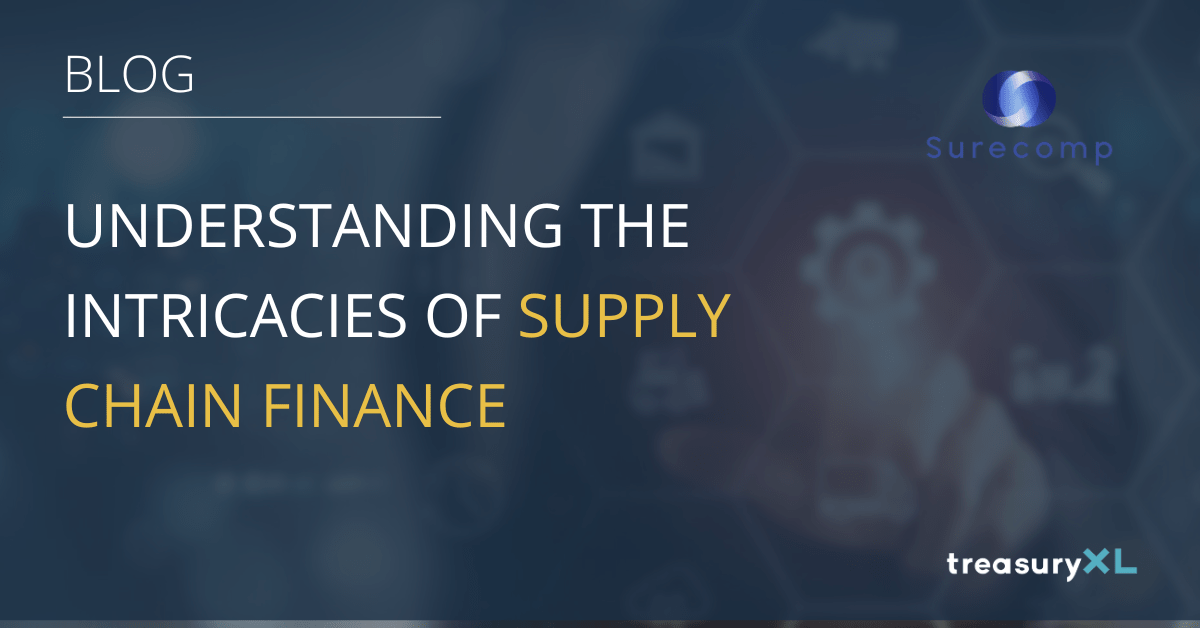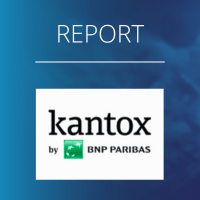Understanding the intricacies of Supply Chain Finance
By Surecomp
The supply chain in any business is a delicate and intricate structure that requires a high level of organisation to operate efficiently.

Disrupting one link in the supply chain can often have a knock-on effect, giving rise to other problems and effectively disrupting the entire business. The larger and more complex the business, the more problems are compounded by the smallest delays and the more expensive they are to rectify.
The legacy of the pandemic and ongoing geo-political unrest continues to cause huge disruption to global trade and supply chains, further exasperated by challenges of cash flow and liquidity, particularly for smaller and mid-sized enterprises (SMEs). As a result, it’s never been more important for companies to optimise their working capital management and supply chain resilience.
So the solution to deploying better preventative measures, to mitigate the risk of illiquidity and ensure an optimal supply chain? Cue Supply chain finance (SCF) – a method of streamlining cash flow to maintain operational efficiency and reduce delays.
What is supply chain finance?
In simple terms, supply chain finance (also known as reverse factoring or approved payables financing, and dynamic discounting or receivables financing) is a financing technique that gives suppliers the ability to receive early payments on their invoices. Late payments and cash flow bottlenecks are two of the biggest factors behind supply chain breakdowns and poor supplier performance. Not only can they damage supplier-buyer relationships, they can affect other supplier relationships along the chain, causing disruption and incurring financial costs in the form of expensive late payment penalties.
Supply chain finance is ultimately about facilitating the movement of capital to help manage risk across the chain, while limiting disruption and streamlining transactions.
How does supply chain finance work?
When a supplier completes a deal with their respective buyer, they send an invoice for payment and record the transaction for book-keeping and auditing purposes. A responsible supplier will have contractually stipulated a clear date by which the invoice needs to be paid. Simple right? Not quite; the truth in the real world is that many buyers cannot and do not initiate supplier contracts with available funds already in the bank. Many secure contracts based on projected earnings before the invoice due date or experience unforeseen circumstances that might obstruct a portion or all of the funds set aside for the supplier. While these situations can often be resolved if the supplier and buyer have a good relationship, it still presents a cash flow problem for the supplier and puts buyers into positions of debt with businesses that aren’t built to handle them.
Supply chain finance functions by installing a bank or other financial institution as the third party in charge of managing transactions between suppliers and buyers, and the effect is two-fold:
Helping buyers settle supplier payments on time
When buyers are unable to pay their suppliers in the required time period stated on the invoice, the bank – being the cash and credit-rich party – will pay the supplier on behalf of the buyer. When this is the case, the buyer’s debt will shift from the supplier to the bank, where the buyer and the bank must negotiate the terms upon which the debt will be settled.
Unlike suppliers who need optimal liquidity to complete transactions, banks can accommodate more flexible payment terms. This eases the pressure on buyers by placing their debt in the hands of an institution designed to absorb it, while also protecting their relationship with suppliers.
Keeping supply chains moving
Supply chain finance also keeps the supply chain moving and functional for suppliers. While one late payment might not kill a suppliers’ business, having multiple active contracts at any given time naturally increases their exposure. Relying on invoice due dates and the credit of active contracts to make cash flow projections and secure future deals, is a risky business. As previously explained, if multiple buyers delay payment it can disrupt operations, damage trade relations and impact working capital.
To minimise pressure and reduce friction in the supply chain, SCF ensures suppliers have a greater degree of assurance that their invoices will be paid on time – or even early in exchange for an agreed discount – optimising liquidity and cash flow forecasting.
Why is supply chain finance important?
At the heart of it, supply chain finance is about ensuring that both parties can meet their obligations with certainty and trust. The financial benefits are clear for the supplier; and the flexible payment terms keep buyers out of trouble, even helping them secure supplier contracts they might not otherwise have been able to secure.
Benefits for the supplier
It should be noted that supply chain finance doesn’t just benefit suppliers when it’s time to invoice. Many financial institutions will allow suppliers to be paid early, which can help those who would otherwise rely on deposits or leveraging their own businesses to another bank to secure the product they would eventually supply to the buyer.
Benefits for the buyer
To secure reverse factoring or payables financing, you as a buyer will need to be able to prove to the lender that your business is healthy enough for them to make the payment on your behalf. Guaranteeing that you can then subsequently meet your own payment obligations to the lender in turn generates supplier confidence. Many markets rely on reputation and investor confidence, and the stamp of approval from a major financial institution creates confidence and strengthens key relationships.
Furthermore, the financial cost charged for early payment is charged to the supplier, not you. In situations where your business runs into further complications, negotiating with a bank could offer the option to extend payment terms without severely damaging the financial stability of the supplier or your reputation with them.
Benefits for the bank
An extra revenue stream for the bank, supply chain finance is predominantly a short-term agreement which represents a low risk of default. Covered under Basel regulations, SCF funds are uncommitted which means that the bank is only regulated according to what is lent, rather than the whole credit limit provided to the buyer.
Efficiency gains from digital processing
Given the importance of navigating supply chain intricacies and the obvious benefits of supply chain finance, we turn then to the question of processing these financing agreements using technology to optimise working capital and operational efficiency.
Unlike documentary trade finance – which traditionally provides funding between parties who do not have a pre-existing relationship – SCF is designed to facilitate open account trade between two parties who have an established relationship or have previously done business together. Also unlike trade finance – which is traditionally a very manual, paper-based process based on the physical exchange of letters of credit and bank guarantee documents – SCF as a more recent concept, can avoid the legacy of paper-based processing and be more readily digitized. SCF platforms form a hub that bring together the lender, buyer and supplier for the accessibility, visibility and digital processing of contract and invoicing data in a time and cost-efficient manner. For example, the use of APIs allows extraction of invoice data direct from the buyer’s sales ledger, without needing ever to be re-keyed. This can then be presented to the parties involved both online and to mobile devices. Once requested, funds can be processed against a set of predefined rules and automatically authorised without the need for manual verification. This reduces both elapsed time and costs which in turn result in lower fees to the customer.
Surecomp’s supply chain finance offering is a full end-to-end solution allowing banks and corporates to seamlessly automate the processing of invoice financing. From submitting or receiving the customer request via our real-time collaborative trade finance platform RIVO™, to measuring risk exposure and eligibility criteria in the back-office via DOKA-NG™, our solution provides a transparent, flexible and scalable means of enhancing your supply chain finance process.
For more information about supply chain finance visit our web page: Supply Chain Finance Processing.
Can’t get enough? Check out these latest items
 https://treasuryxl.com/wp-content/uploads/2025/07/Featured_Automation-Boutique-1.png
200
200
treasuryXL
https://treasuryxl.com/wp-content/uploads/2018/07/treasuryXL-logo-300x56.png
treasuryXL2025-07-09 07:00:512025-07-08 14:53:53New: Real-time Rabobank account data in Excel & Power BI
https://treasuryxl.com/wp-content/uploads/2025/07/Featured_Automation-Boutique-1.png
200
200
treasuryXL
https://treasuryxl.com/wp-content/uploads/2018/07/treasuryXL-logo-300x56.png
treasuryXL2025-07-09 07:00:512025-07-08 14:53:53New: Real-time Rabobank account data in Excel & Power BI https://treasuryxl.com/wp-content/uploads/2025/07/Surecomp-BLOGS-featured-9.png
200
200
treasuryXL
https://treasuryxl.com/wp-content/uploads/2018/07/treasuryXL-logo-300x56.png
treasuryXL2025-07-08 07:00:102025-07-07 15:26:05In conversation with Surecomp’s Head of Solution Consulting, Arjo Haksteen
https://treasuryxl.com/wp-content/uploads/2025/07/Surecomp-BLOGS-featured-9.png
200
200
treasuryXL
https://treasuryxl.com/wp-content/uploads/2018/07/treasuryXL-logo-300x56.png
treasuryXL2025-07-08 07:00:102025-07-07 15:26:05In conversation with Surecomp’s Head of Solution Consulting, Arjo Haksteen https://treasuryxl.com/wp-content/uploads/2025/02/Blog-Kyriba-2.png
200
200
treasuryXL
https://treasuryxl.com/wp-content/uploads/2018/07/treasuryXL-logo-300x56.png
treasuryXL2025-07-07 07:00:042025-07-04 13:30:217 key benchmarks for treasury’s 2025 investment and liquidity plans
https://treasuryxl.com/wp-content/uploads/2025/02/Blog-Kyriba-2.png
200
200
treasuryXL
https://treasuryxl.com/wp-content/uploads/2018/07/treasuryXL-logo-300x56.png
treasuryXL2025-07-07 07:00:042025-07-04 13:30:217 key benchmarks for treasury’s 2025 investment and liquidity plans https://treasuryxl.com/wp-content/uploads/2024/01/Template_VACANCY-featured.png
200
200
treasuryXL
https://treasuryxl.com/wp-content/uploads/2018/07/treasuryXL-logo-300x56.png
treasuryXL2025-07-04 07:00:232025-07-04 13:20:02Vacancy Treasury Team Lead – Amsterdam
https://treasuryxl.com/wp-content/uploads/2024/01/Template_VACANCY-featured.png
200
200
treasuryXL
https://treasuryxl.com/wp-content/uploads/2018/07/treasuryXL-logo-300x56.png
treasuryXL2025-07-04 07:00:232025-07-04 13:20:02Vacancy Treasury Team Lead – Amsterdam https://treasuryxl.com/wp-content/uploads/2023/03/Treasurer-Search-Logo.png
200
200
treasuryXL
https://treasuryxl.com/wp-content/uploads/2018/07/treasuryXL-logo-300x56.png
treasuryXL2025-07-03 11:15:142025-07-10 11:39:51Treasury Team Lead – Amsterdam @ Treasurer Search
https://treasuryxl.com/wp-content/uploads/2023/03/Treasurer-Search-Logo.png
200
200
treasuryXL
https://treasuryxl.com/wp-content/uploads/2018/07/treasuryXL-logo-300x56.png
treasuryXL2025-07-03 11:15:142025-07-10 11:39:51Treasury Team Lead – Amsterdam @ Treasurer Search https://treasuryxl.com/wp-content/uploads/2025/07/Europol.png
200
200
treasuryXL
https://treasuryxl.com/wp-content/uploads/2018/07/treasuryXL-logo-300x56.png
treasuryXL2025-07-03 11:13:582025-07-10 11:37:11Specialist – Finance @ Europol
https://treasuryxl.com/wp-content/uploads/2025/07/Europol.png
200
200
treasuryXL
https://treasuryxl.com/wp-content/uploads/2018/07/treasuryXL-logo-300x56.png
treasuryXL2025-07-03 11:13:582025-07-10 11:37:11Specialist – Finance @ Europol https://treasuryxl.com/wp-content/uploads/2025/04/Treasury-Spring-van-Template-2.png
200
200
treasuryXL
https://treasuryxl.com/wp-content/uploads/2018/07/treasuryXL-logo-300x56.png
treasuryXL2025-07-03 08:49:572025-07-03 08:51:48Heating up? Political tension holds, whilst market calm returns.
https://treasuryxl.com/wp-content/uploads/2025/04/Treasury-Spring-van-Template-2.png
200
200
treasuryXL
https://treasuryxl.com/wp-content/uploads/2018/07/treasuryXL-logo-300x56.png
treasuryXL2025-07-03 08:49:572025-07-03 08:51:48Heating up? Political tension holds, whilst market calm returns. https://treasuryxl.com/wp-content/uploads/2025/02/KantoxBLOGS-featured-3.png
200
200
treasuryXL
https://treasuryxl.com/wp-content/uploads/2018/07/treasuryXL-logo-300x56.png
treasuryXL2025-07-02 07:00:212025-06-30 16:36:19Removing FX Gains & Losses: Balance Sheet Hedging Redefined
https://treasuryxl.com/wp-content/uploads/2025/02/KantoxBLOGS-featured-3.png
200
200
treasuryXL
https://treasuryxl.com/wp-content/uploads/2018/07/treasuryXL-logo-300x56.png
treasuryXL2025-07-02 07:00:212025-06-30 16:36:19Removing FX Gains & Losses: Balance Sheet Hedging Redefined https://treasuryxl.com/wp-content/uploads/2023/03/Treasurer-Search-Logo.png
200
200
treasuryXL
https://treasuryxl.com/wp-content/uploads/2018/07/treasuryXL-logo-300x56.png
treasuryXL2025-07-01 10:25:252025-07-01 10:35:38Specialist Trade Finance (m/w/d) – Hessen
https://treasuryxl.com/wp-content/uploads/2023/03/Treasurer-Search-Logo.png
200
200
treasuryXL
https://treasuryxl.com/wp-content/uploads/2018/07/treasuryXL-logo-300x56.png
treasuryXL2025-07-01 10:25:252025-07-01 10:35:38Specialist Trade Finance (m/w/d) – Hessen


